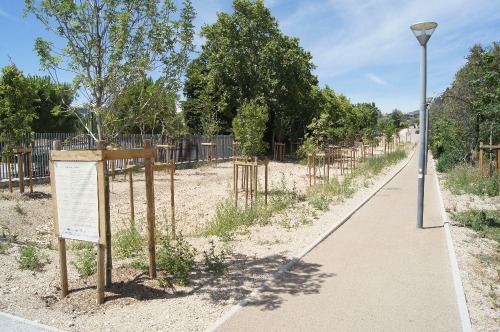Project description
CARDIMED aims to improve climate resilience in the Mediterranean by integrating NBS into systemic transformation. The project bases its work on 4 pillars that allow a systemic transformation for regional climate resilience in the Mediterranean, through the unification and integration of NBS and other engineering infrastructures.
CARDIMED is an ambitious IA project funded by the European Commission coordinated by the Laboratory of Sanitary Engineering of the National Technical University of Athens (NTUA). It brings together partners from 14 countries, including universities, research organisations, companies and NGOs, all committed to the mission of making Mediterranean regions more resilient in the face of climate change.
The CARDIMED framework and NBS approach is being tested in carefully selected demonstration sites covering a diversity of the Mediterranean region contexts, challenges, and technologies to ensure that results are truly replicable and that wide socio-ecological and cultural diversity of the region is considered. Throughout its duration, the project will demonstrate 47 different types of NBS through 83 interventions in 10 regions and 20 locations.


The participating communities will establish the CARDIMED Resilience Alliance, which will function as a vehicle for expanding the network by extending existing sites and adding new ones. The project plans to have 28 regions and 70 communities in the network by 2030, create 8,000 jobs in the NFC sector and mobilise more than €450 million in climate investments.
The Euro-mediterranean Water Information System on know-how in the Water Sector (SEMIDE/EMWIS) plays a multi-dimensional role in CARDIMED and is in charge of:
- Leader of demonstration site 5 in Marseille, France (coordination and progress monitoring, including NBS cataloguing and stakeholder identification.
- Replication in non-EU Mediterranean area.
- Networking, interaction with policy shaping and decision making, and financing support in replication and transferability.
The CARDIMED consortium includes 51 partners from 14 countries:
Greece: Ethnicon Metsovion Polytechnion; Institute of Communication and Computer System (ICCS); Core Kentro Kainotomias MAKE; Libra AI Technologies; Mediterranean Institute for Nature and Anthropos (MedINA); Hydraspis O.E.; Region of North Aegean; Perifereia Notiou Aigaiou; ElvalHalcor Hellenic Copper and Aluminium industry S.A; Perifereia Stereas Elladas; Gkonelas K. - Patelis M. O.E.
Netherlands: Universiteit Utrecht.
United Kingdom: Brunel University London.
Spain: Bioazul, SL, Cetaqua, Centro Tecnológico Del Agua, Fundación Privada; Centro De Investigación Ecológica y Aplicaciones (CREAF); Centro Tecnológico de la Construcción (CTCON); Instituto tecnológico De Aragón; CIRCE Centro de Investigación de Recures; Gobierno de Aragón; Fundación Universitaria Balmes; Sociedad Española de Ornitología (SEO); Ayuntamiento De Murcia.
Portugal: Universidade de Evora; Comunidade Intermunicipal Do Alentejo Central (CIMAC).
Germany: ICLEI European Secretariat GMBH.
Austria: alchemia-nova GmbH, institute for circular economy & nature-based solutions; BABEG Kärntner Betriebsansiedlungs-und Beteiligungsgesellschaft m.b.H.
Italy: ALEA Srl, Università Politecnica delle Marche; Alma Mater Studiorum - Università di Bologna, Regione Autonoma della Sardegna; IRIDRA SRL; Università degli Studi di Catania; Comune di Catania; Regione Siciliana - Dipartimento Regionale Tecnico; SVI.MED Centro Euromediterraneo per lo Sviluppo.
France: Unité Technique du SEMIDE GEIE; Université D’Aix Marseille; EMPAN Entrepreneurs Pour La Planète Laure Moreau; Conseil Régional Provence Alpes Côte D’Azur.
Cyprus: eBOS Technologies Limited; Gardens of the Future; Lefkosia Municipality
Turkey: Izmir Institute of Technology; Izmir Metropolitan Municipality Izdoğa Company; Izmir Büyükşehir Belediyesi; Izmir Su ve Kanalizasyon İdaresi Genel Müdürlüğü; Doğa Derneği.
Malta: Energy And Water Agency.
Croatia: IRENA - Istarska Regionalna Energetska Agencija.

The participating communities will establish the CARDIMED Resilience Alliance, which will function as a vehicle for expanding the network by extending existing sites and adding new ones. The project plans to have 28 regions and 70 communities in the network by 2030, create 8,000 jobs in the NFC sector and mobilise more than €450 million in climate investments.
The Euro-mediterranean Water Information System on know-how in the Water Sector (SEMIDE/EMWIS) plays a multi-dimensional role in CARDIMED and is in charge of:
- Leader of demonstration site 5 in Marseille, France (coordination and progress monitoring, including NBS cataloguing and stakeholder identification.
- Replication in non-EU Mediterranean area.
- Networking, interaction with policy shaping and decision making, and financing support in replication and transferability.


